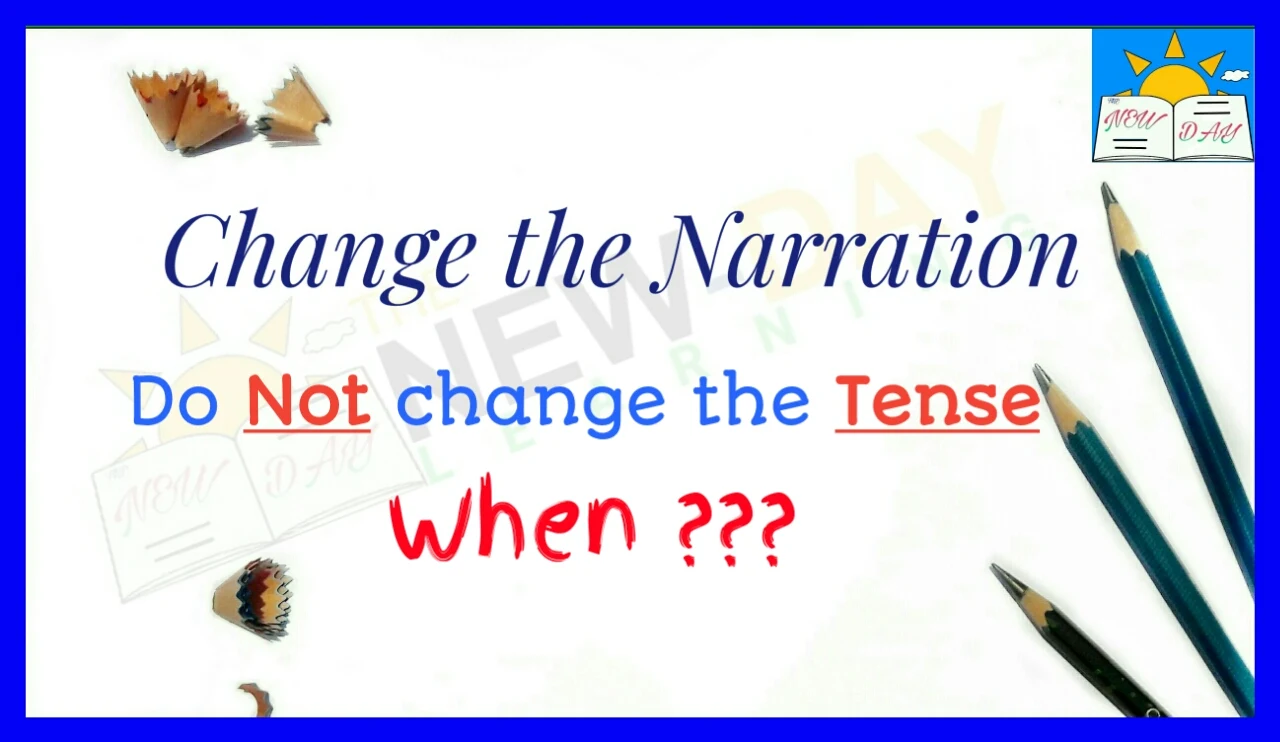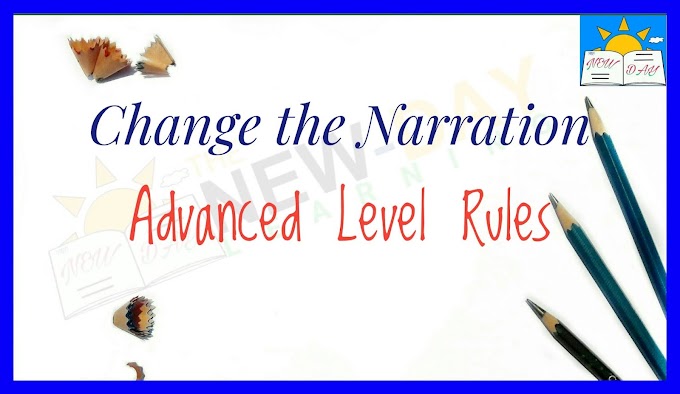Not sure how to change the narration of Universal Truth, Habitual Actions, Historical Events?
That's what we are going to talk about here.
Table of Contents
So all you have to do is only to remember a simple rule, that is -
When the reported clause/statement of a direct speech is a universal truth speech or any historical event or a habitual action (a part of the daily routine), then the tense in the indirect speech doesn’t change, no matter in whatever tense the reporting verb (say/said) is.
Let's say there is a reported statement the teacher said, "The sun rises in the east."
We know that the reported statement changes according to the tense of the reporting verb in the indirect speech.
But in this case, the reported speech “The sun rises in the east” won't change though the reporting verb 'said' is in the past.
But Why?
It happens because, the statement is a description of a natural incident, and so, it is universally true. It means, you can never alter the speech as you can't alter the natural incident.
You cannot say that the sun rose in the east. If you say this you'll mean that the sun rose in the east today and often, it rises in other directions. But it has been rising in the east from millions of years ago and will continue to do so millions of years after.
Isn’t it?
For the same reason, in habitual actions and historical events, the tense is not changed.
Well,
Are you curious to know how it happens?
Continue reading...
Indirect Narration of
Universal Truth
Here we are going to see that the reported statement of each direct narration is a universal truth, that is a statement universally accepted as true.
Universal truth speeches include - any moral principle, natural phenomena, mathematical equation, scientific statement etc.
Have a look at the examples –
I. Moral Principles and Proverbs:
Direct – Mr. Sen said, “Truth wins always.”
Indirect – Mr. Sen said that Truth wins always.
...Truth won always. ❌
Direct – “Honesty is the best policy.” They said.
Indirect – They said that honesty is the best policy.
Direct – The teacher said to us, “Man is mortal.”
Indirect – The teacher told us that Man is mortal.
... man was mortal.❌
Direct – “An apple a day keeps the doctors away.” My grand father said with an apple in his hand.
Indirect – My grand father said with an apple in his hand that an apple a day keeps the doctors away.
Direct – She said, “A drowning man will clutch at a straw.”
Indirect – She said that a drowning man will clutch at a straw.
Direct – I said, “Cleanliness is next to godliness.”
Indirect – I said that cleanliness is next to godliness.
Direct – The lady said, “An empty vessel makes much noise.”
Indirect – The lady said that an empty vessel makes much noise.
Direct – The leader said, “Where there is will there is a way.”
Indirect – The leader said that where there is will there is a way.
Direct – I said, “A cat has nine lives.”
Indirect – I said that a cat has nine lives.
Direct – The man said, “A barking dog seldom bites.”
Indirect – The man said that a barking dog seldom bites.
Direct – His wife said to him, “A bad workman always blames his tools.”
Indirect – His wife told him that a bad workman always blames his tools.
II. Natural Phenomena:
Colour –
Direct – He said to me, “Grass is green.”
Indirect – He told me that grass is green
Direct – Harry said, “Milk is white.”
Indirect – Harry said that milk is white.
Direct – She said to me, “Coal is black.”
Indirect – She told me that coal is black.
Direct – The mother said to the baby, “Sky is blue.”
Indirect – The mother told the baby that sky is blue.
Direct – She said to us, “The colour of blood is red.”
Indirect – She told us that the colour of human blood is red.
Direct – I said, “Water is colourless.”
Indirect – I said that water is colourless.
Taste –
Direct – “Water is tasteless.” Said the the teacher.
Indirect – The teacher said that water is tasteless.
Direct – “Honey tastes sweet.” Said the child.
Indirect – The child said that honey tastes sweet.
Others –
Direct – The teacher said, “The sun gives us light.”
Indirect – The teacher said that the sun gives us light.
Direct – Jack said, “The dog is a faithful animal.”
Indirect – Jack said that the dog is a faithful animal.
Direct – The student said, “The sun reses in the east.”
Indirect – The student said that the sun rises in the east.
III. Mathematical Equations:
Direct – “Five and five make ten.” Said the girl.
Indirect – The girl said that five and five make four.
Direct – “Three and six make nine.” She said.
Indirect – She said that three and six make nine.
Direct – The mother said to the child, “If we multiply ten with five, we get fifty.”
Indirect – The mother taught the child that if we multiply ten with five, we get fifty.
Direct – The mother said to the child, “Three times eight is twenty-four.”
Indirect – The mother taught the child that three times eight is twenty-four.
(Three times eight is twenty-four => 8×3 = 24)
IV. Scientific Statements:
Direct – The teacher said to the children, “Water freezes into ice below 0°C.”
Indirect – The teacher told the children that water freezes into ice below 0°C.
Direct – The teacher said, “Acid reacts with a base to form salt.”
Indirect – The teacher said that Acid reacts with a base to form salt.
V. Other -
Direct – I said, “The leaning tower of Pisa is a wonder.”
Indirect – I said that the leaning tower of Pisa is a wonder.
Direct – He said, “The earth moves around the sun.”
Indirect – He said that the earth moves around the sun.
...moved around the sun.❌
[Related: Direct and Indirect Speech rules for Vocative word or Addressing word.]
Read more: 100+ Narration change Exercises.
Indirect Narration of
Habitual Action
**Habitual actions are those actions that are performed by a person regularly.
For a speech denoting a habitual action, words/phrases like every, every morning, every night, every afternoon, every week, every month, every year, daily, once a day, once a week etc. are used in the reported speech.
E.g. –
Direct – Ram said, "We play cricket everyday."
Indirect – Ram said that they play cricket everyday.
...played cricket everyday. ❌
Direct – He said to me, “I go to school everyday.”
Indirect – He told me that he goes to school everyday.
...went to school everyday. ❌
Direct – Mohan said to me, “My grandfather does yoga every morning.”
Indirect – Mohan told me that his grandfather does yoga every morning.
... did yoga every morning. ❌
Direct – She said to the boy, “What do you play every afternoon?”
Indirect – She asked the boy what does he play every afternoon.
... what did he play... ❌
Direct – I said to them, “I watch movies daily.”
Indirect – I told them that I watch movies daily.
... I watched... ❌
Direct – She said to me, “Kalpit comes here once a day.”
Indirect – she told me that Kalpit goes there once a day.
... went there... ❌
Direct – Rihana said to me, “We play chess once a week.”
Indirect – Rihana told me that they play chess once a week.
...played chess... ❌
Direct – The lady said, “He calls me once in a blue moon.”
Indirect – the lady said that he calls her once in a blue moon.
...called her... ❌
Direct – They said to the man, “The dog barks every afternoon.”
Indirect – They told the man that the dog barks every afternoon.
... dog barked ... ❌
Related: Direct and Indirect Speech - WH Questions.
Indirect Narration of
Historical Event
One of the basic rules for changing the narration suggests that - when the reporting verb and the reported speech both are in past tense, then the indirect speech will be in past perfect tense.
But, in case the reported speech is a historical fact, the aforementioned rule is not followed.
Rather, the reported speech is written in the indirect as it is (in past tense)
E.g. –
Direct – Our teacher said, “The French Revolution had started in 1789.”
Indirect – Our teacher said that the French Revolution had started in 1789.
... had been started... ❌
Direct – I said to them, “Mahatma Gandhi died on 30th January, 1948.”
Indirect – I told them that Mahatma Gandhi died on 30th January, 1948.
... had died... ❌
Direct – He said to us, “Srigupta founded the Gupta Dynasty.”
Indirect – He told us that Srigupta Founded the Gupta Dynasty.
... had founded... ❌
Direct – Our teacher said to us, “The Russian Revolution took place in 1917.”
Indirect – Our teacher told us that the Russian Revolution took place in 1917.
... had taken place... ❌
Direct – I said to him, “The English defeated the French in the Battle of Swalley.”
Indirect – I told him that the English Defeated the French in the Battle of Swalley.
... had defeated... ❌
Direct – He said to us, “The English came to India after the Portuguese.”
Indirect – He told us that the English came to India after the Portuguese.
...had come to... ❌
Direct – Ammie said to us, “Hitler first attacked Poland.”
Indirect – Ammie told us that Hitler first attacked Poland.
...had attacked... ❌
Direct – The student said, “The Industrial Revolution occurred during the period from around 1760 to about 1820–1840.”
Indirect – The student said that the Industrial Revolution occurred during the period from around 1760 to about 1820–1840.
Read more: How to Change the Narration of Different Sentences (Basic Level of Changing the Narration).
Now you know everything about how to change the narration of Universal Truth, Habitual Actions and Historical Events.
Thank you...





%20(1).webp)


%20(1).webp)
8 Comments
it is a hard thing to be very poor.
ReplyDeleteWhat about this one??
What will be its narration
Yeah. It is a universally true speech. So, you needn't change anything.
DeleteIt was really helpful
ReplyDeleteHe said to me "do women tend to live longer than men in this world?"
ReplyDeleteConvert it please
She said, "I know you. You are Sam and you live next door." How will I convert to indirect speech?
ReplyDeletePlease give the examples of molarity in direct and indirect speech
ReplyDeleteHighly useful
ReplyDeleteHighly useful
ReplyDeleteLeave a comment